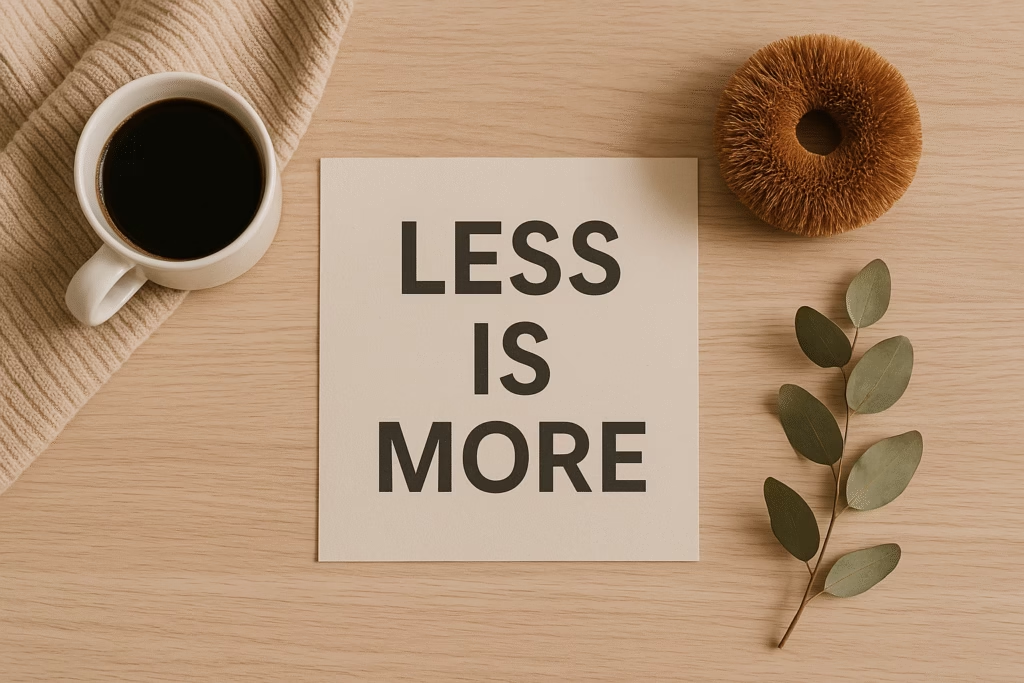In a world driven by marketing, fast fashion, and instant gratification, the idea of consuming less can feel radical. Yet for those who choose a simpler, more intentional life, the principle of “less is more” becomes a powerful truth.
This article explores how conscious consumption not only saves money but also improves your mental well-being, relationships, and the planet.
What Is Conscious Consumption?
Conscious consumption means being aware of the impact of your purchases. It involves asking:
-
Do I really need this?
-
Who made this and under what conditions?
-
Will this last or be discarded soon?
-
What impact does this have on the environment or society?
It’s about aligning your consumption with your values, instead of reacting to trends or emotional impulses.
1. Less Stuff = Less Stress
Owning fewer things means having:
-
Less to clean
-
Less to organize
-
Fewer decisions to make
Our brains crave simplicity. Studies show that cluttered environments contribute to anxiety and decision fatigue. Conscious consumption helps reduce the overload—both physical and mental.
2. You Save Money Without Feeling Deprived
When you buy only what you truly need or value, your money stretches further. Conscious consumers often discover:
-
They shop less frequently
-
They invest in better-quality items
-
They feel more satisfied with what they already own
This leads to natural savings and financial peace—without the guilt or stress of compulsive budgeting.
3. Better Relationships, Less Comparison
Minimalism and intentional consumption shift your focus from things to people. When you stop chasing the latest gadgets or fashion, you begin to:
-
Value experiences over possessions
-
Appreciate deeper conversations
-
Avoid the toxicity of social media comparison
Suddenly, connection matters more than image.
4. A Smaller Environmental Footprint
Every purchase leaves a trace. Conscious consumers reduce waste, pollution, and exploitation by:
-
Avoiding fast fashion
-
Choosing reusable over disposable
-
Supporting ethical and local businesses
Less consumption leads to less waste—and a healthier planet.
5. More Freedom and Flexibility
Stuff weighs us down—physically, financially, and emotionally. When you own less and spend less:
-
You can travel more easily
-
You can work fewer hours
-
You’re less dependent on a high income
Freedom isn’t found in more—it’s found in enough.
6. You Discover What Truly Matters
Intentional living reveals your real priorities. Without the distractions of constant consumption, you have space to ask:
-
What brings me joy?
-
What activities give me energy?
-
What kind of life do I want to build?
These answers shape your future far more than any material item ever could.
How to Start Consuming More Consciously
You don’t have to overhaul your life overnight. Here’s how to ease in:
-
Wait 48 hours before making non-essential purchases
-
Declutter one area of your home per week
-
Unsubscribe from marketing emails
-
Buy from local or ethical sources
-
Replace impulse spending with intentional habits (journaling, nature walks, DIY, etc.)
Start where you are, with what you have.
Conscious Consumption Isn’t About Perfection
You will still consume. You’ll still make mistakes. Conscious consumption isn’t a rigid rule—it’s a mindset. One rooted in awareness, gratitude, and enoughness.
It’s about making better choices more often, not perfect ones always.
The Power of Choosing Less
In a world that constantly tells you to want more, choosing less becomes a radical act of freedom.
Conscious consumption is about reclaiming your time, your money, your energy, and your attention. It’s not about living with nothing—it’s about making space for everything that matters.






